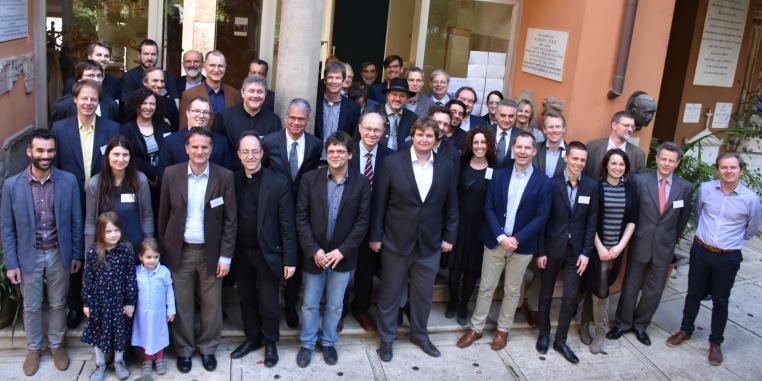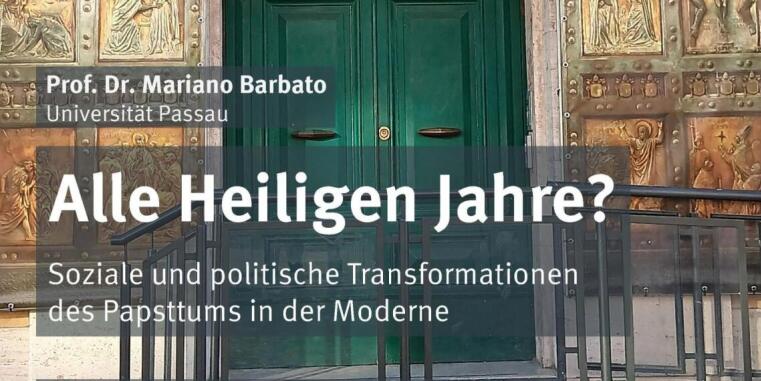















“How many legions does the pope have?” Magnified by the media, flows of pilgrims to Rome and to the pope himself on pilgrimage create the sociological basis for the political resurgence of the Holy See. Entitled “The legions of the pope”, the interdisciplinary DFG project in the political sciences uses papal pilgrims and pilgrim popes in its case study to analyze transnational constructions of identity and political agency in the transformations of (post)secular modernity.
In doing so, the project adopts a constructivist agenda, assuming as it does that agency, practice and identity are central factors in transformation. The role of religion is embedded in the broader issue of political belonging and in the question of how a social practice can transform ideas into power. The role of a religious community in a secular environment, in this case that of the papacy in Europe, serves as a critical test case for actorness and agency. Pilgrim popes (popes who travel the world) and papal pilgrims (the crowds of visitors to the pope in Rome or on his travels) are analyzed to show how mass mobilization can contribute to the re-emergence of a former great power as a transnational actor in a post-national society.
Led by Heisenberg Fellow Mariano Barbato and with the collaboration of Johannes Löffler, the project is supported by a German Research Foundation grant for equipment. One of its objectives is to create a network of interdisciplinary research that deals with the pope and politics in the transformations of modernity. At the invitation of the Roman Institute of the Görres Society, the project held an interdisciplinary conference at Campo Santo in March 2017. In June 2019, the interdisciplinary workshop "Papal Diplomacy" took place in Wroclaw in cooperation with the Willy Brandt Centre for German and European Studies at the University of Wroclaw. Link to conference report.
After eight years of intensive research and interdisciplinary collaboration, the DFG project "The Legions of the Pope" was successfully completed in 2023. From June 15 to 17, 2023, the final conference of the project titled „Das Erbe der deutschen Päpste. Von Clemens II. bis Benedikt XVI.“ took place in Bamberg in cooperation with the Chair of Church History at the University of Bamberg.
Analysing the flows of pilgrims to Rome and to the popes themselves provided valuable insights into transnational identity constructions and political agency in the (post)-secular transformations of modernity. The results of this study not only contribute to the understanding of the role of the papacy in modern society, but also provide impulses for future research in the field of political sociology and international relations.

Mariano Barbaot was DFG Heisenberg Fellow and Principal Investigator of the project "The legions of the pope: A case study of social and political transformation”.

Johannes Ludwig Löffler was a doctoral student in the The Pope's Legions from 2016 to 2022 with a dissertation project on the Communication Strategies of Pope Francis in the Political Public Sphere.
Johannes Löffler, Die Kommunikationsstrategien von Papst Franziskus, Frankfurt/New York: Campus Verlag 2023.
Mariano Barbato, „Die Mauer ist keine Lösung“. Die Migrationspolitik von Papst Franziskus, Frankfurt/New York: Campus Verlag 2020 (Religion und Moderne).
Mariano P. Barbato (Ed.), The Pope, the Public and International Relations: Postsecular Transformations, New York: Palgrave Macmillan 2020.
Mariano Barbato/Stefan Heid (Hg.), Macht und Mobilisierung. Der politische Aufstieg des Papsttums seit dem Ausgang des 19. Jahrhunderts, Freiburg im Breisgau: Herder 2020.
Mariano Barbato/Melanie Barbato/Johannes Löffler (Eds.), Wege zum digitalen Papsttum: Der Vatikan im Wandel medialer Öffentlichkeit, Frankfurt/New York: Campus Verlag 2018 (Religion und Moderne).